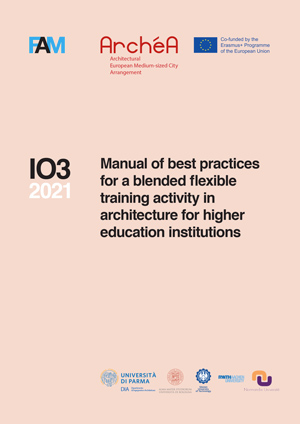Virtual exhibition for design workshops. Some experiences at DiARC_ University of Naples “Federico II
Pubblicato 2021-12-10
Parole chiave
- ArchéA,
- blended flexible training,
- best practices
Come citare
Abstract
In the following we describe some conceptual steps and problematic nodes concerning the theme of new and integrable ways of laboratory teaching aided by advanced computer tools developed at the Architectural and Urban Composition Studio or Final Architectural Studio of the five-year single- cycle degree courses in Architecture and the Master’s degree course in Architectural Studio at the DiARC of the University of Naples “Federico II” held – - in the academic years 2019-20 and 2020-21 – and coordinated by Renato Capozzi with the collaboration of Nicola Campanile, Gennaro Di Costanzo, Roberta Esposito, Oreste Lubrano, Claudia Sansò and Francesca Spacagna. The contribution, starting from a questioning of the potentialities but also of the limits of a didactics of the project according to the D.a.D. or blended modality according to a wider perspective of heterotopic sense of Foucauldian matrix in the paragraph “Real VS Virtual”, is articulated in three more technical related paragraphs: “The 3D models”; “Elaboration of the sharing interface”; “Experiences of virtual exhibitions”. The essay ends with some provisional “Conclusions” that reflect on the actual potentialities and development prospects of the combined use of the technologies employed. While the text “3D Models” analyses the main techniques for the production of virtual models to define the spheroidal environment in which the exhibition is to be located and the fundamental elements (graphics and models) for the construction of the exhibition’s itinerary or multiple itineraries, the following section describes the phases of elaboration of the multimedia product to be shared on the web or through other media, offering the user autonomous navigation in the exhibition spaces and a strong interactivity of its contents. At the end, the main experiences of virtual exhibitions produced in 2020 and 2021 are reported and exhibited for the first time on 28th November 2020 (only for a part related to the annus terribilis 2020) in the Researcher’s European night, promoted by MEET me TONIGHT “Faccia a Faccia con la ricerca”, Link city | DiARC UNINA neaPòlis Scuola Politecnica e delle scienze di base – Università degli Studi di Napoli “Federico II” through the system: Jitsi Meetings.

